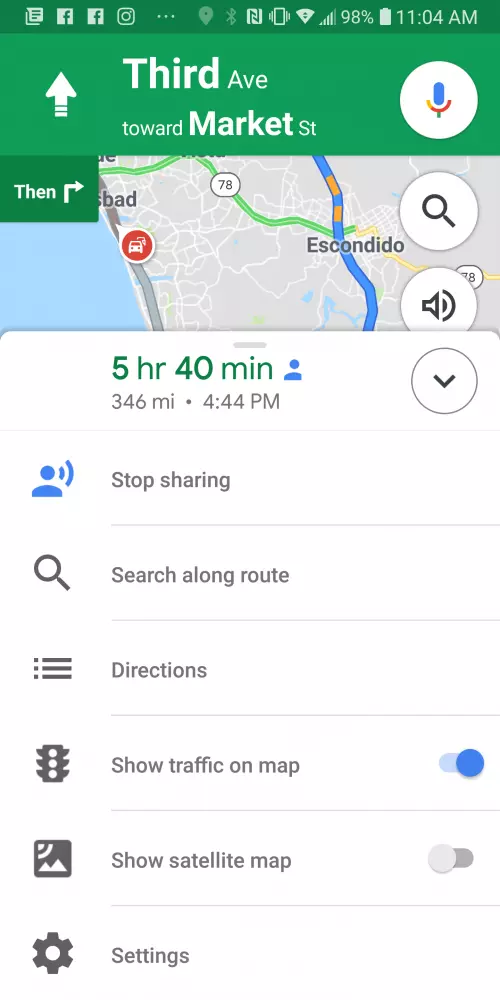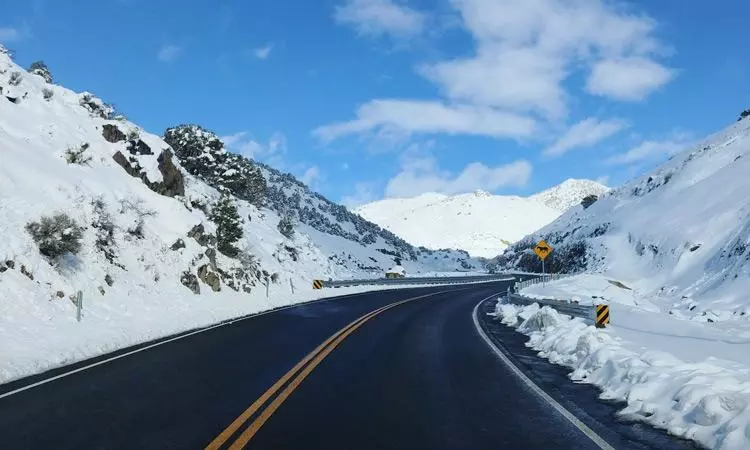While most people consider road tripping to be something best done during the summer - some of the busiest days on the road happen during the winter holidays. This means that not only do you need to watch out for fellow drivers and general traffic concerns, but also the risk that you might get stranded in snowstorm and need to pull to the side of the road. Even worse is the possibility that you lose control and your car ends up stuck in the snow waiting for help to arrive. Here's what to do to help make sure you survive getting stranded in the snow on a winter road trip
Plan Ahead and Make Sure Your Car Is Prepared For Winter Driving
Planning ahead and making sure that your car is prepared for winter driving is an important first step. You need to make sure that you have good winter tires as well as confirming that all fluids are prepared for the journey ahead. There's obviously a spectrum here when it comes to winter driving so what you need to prepare for may be different for a winter road trip from Atlanta to Nashville vs a trip through the Rockies or even across the frozen tundra of Alaska. However, the core issues remain ...
Winter Tires - While All-Weather tires will be "ok" for driving in winter, you should consider tires specifically designed for winter driving. For instance, the Michelin XI3 winter tires are specifically designed for extreme winter conditions. Winter tires are designed to stay soft and have more grip on cold surfaces giving you better control. They are also designed with deeper tread depth and special tread designs to allow for better traction and to get ice and slush out of the way vs having it build up on the tires.
Fluids - For most winter driving in the "lower 48", you should be fine with most of your fluids. However, if you are planning a trip to Northern Michigan, Minnesota, North Dakota etc. where the temperatures can be extremely cold (-30 and below), you should look into adjusting the blend of your antifreeze and automotive oil. Probably the fluid you need to be most concerned about would be wiper fluid since not all are designed for extremely low temperatures the way engine fluids are. This is why you will often see slush building up on your wipers - even though it's not snowing outside. If your trip will include these conditions, make sure to swap out your normal wiper fluid for de-icer instead. This will not only resist freezing, but keep ice from building up on your windshield as well.
Battery Strength - Extreme cold is terrible for car batteries. If you are planning a long winter road trip, make sure to not just test the strength of your battery but consider getting a new one designed for low temperatures if you have any concerns. A new battery is going to be far cheaper than finding out you need one while stranded and freezing in the cold on the side of a road!
Pack an Emergency Kit For Winter Emergencies
With your car prepared for winter driving, it's important that you prepare for emergencies as well. Your standard automotive emergency kit should be sufficient here - flares, blanket, tools etc. Additionally, you should plan to have a shovel and extra food and water since snow may delay a normal rescue by many hours or even days.
Practice First Aid
First aid kits should always be brought with you in the car - no matter the length or condition of a road trip. If you find yourself stuck and hurt in some way you will need to try and treat it a little bit before you try and go anywhere. If you have a cut or cuts, make sure to clean them out thoroughly because you are at high risk of infection in the wild. You can also use bandages for sprains and strains and think about using your rubbing alcohol or wipes to sterilize everything and keep it clean. It might be painful at first but it will make all the difference when you try to recover.
Assess the Situation Call for Help
The first thing you will need to try and do when you are stranded somewhere is to assess the situation. Is this something you can dig yourself out of? Are any injuries life threatening?
Once you've decided those things, you need to formulate a plan to get help. Your first response should be to call a family member or even your hotel and let them know your status. This way if you lose access to your phone due to reception issues or battery, someone will know where you are and what condition you are in. Based on this, they can then decide if you just need someone to help with changing a tire, a wrecker with a crane to pull you out of a ditch, or even if they need to send out medical emergency flights.
Stay Calm And Don't Panic
Of course, being in a situation like this can be incredibly difficult and the idea of being trapped will understandably make you feel a little bit vulnerable and weak. However the best thing you can do is keep a clear head and make sure you stay calm. Being calm is the one thing you need to do to keep your body at a regular temperature as well as to help you focus on what is going on around you. Take a deep breath and don’t panic. Plus, when you fail to think clearly, that's when you make mistakes.

Find People To Help
Generally when faced with an emergency in a hostile situation it is best to stay with your vehicle. This sounds counterintuitive but it is true during extreme heat in the desert - and it's true during extreme cold during the winter.
However, if you are on the highway still, there are things you can do to better assess the situation.
Put a flag Out - You should have caution flags and flares in your emergency kit, but if you didn't take that advice - hang a blanket outside the car, tied into the trunk, a window, or even hanging from the antenna. Make it something obvious so that people know you are in distress.
Use Your Phone and Apps to Identify Where You Are - This is a two part piece of advice. The first is that you will be able to identify where you are by looking at the map on your phone. Even without reception you should be able to see the location on GPS. If for some reason you aren't able to see any towns close then stay with the vehicle. If you do see a town that is close - leave a note in the car with where you are going. If you are lucky and have reception, put location tracking or even better do so at the beginning of your trip so someone knows where you are going. This will allow them to locate you if you aren't able to call for help since they will generally know when you lost contact and where you might be.
If you do decide to hike out and seek help, make sure you are prepared by bringing snacks and extra water. Stick to the main roads and try to flag people down if you see anyone before you reach your destination.
Ration Food and Drinks
You should always have extra food and water in your car during a road trip. When you become stranded in the winter though, it's critical to ration those items since you don't know how long it will be needed. It is much better for you to ration small amounts and keep your hydration and sugar levels constant by consuming some every few hours than to eat when you are hungry. This will help keep your body alert and awake and make sure you have the energy to move around. It will also reduce the likelihood of bad decisions caused by reduced mental ability.
Luckily, since you are stuck in the snow there should be plenty of water. However, you should be cautious when consuming this because you don't know pollutant levels etc. If you are at the point where you absolutely need water then look for as clean of a spot as possible to pull from or even put a cup on your roof to catch freshly fallen snow and then bring it inside to melt through the ambient heat in the car.
